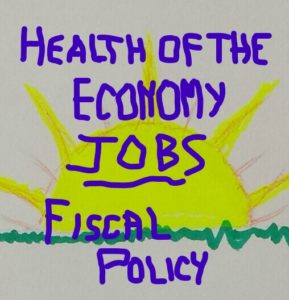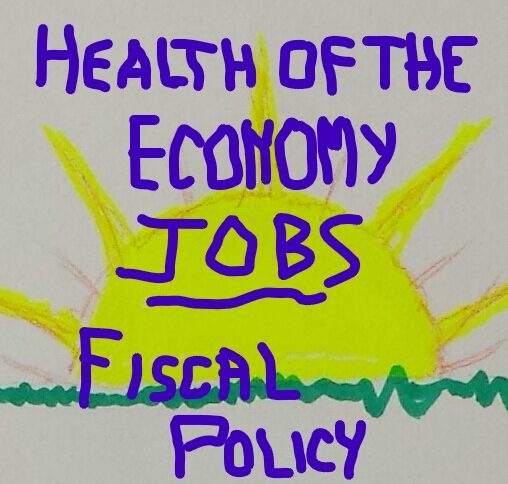
[ANALYSIS/OPINION]
Contrary to popular belief the President of the United States is not, under our Constitution, a dictator—or at least he is not supposed to be. In fact, there two other branches of government, namely, Congress and the Supreme Court. We’ll put aside the Supreme Court because they have no direct effect on inflation. But we still have to take into account Congressional responsibility, if any, for causing inflation.
But into the mix we have to add another critically important institution, the Federal Reserve.
To cut to the chase, economic policy in this country and hence inflation, is very largely (but not exclusively) caused/ created by two forces: fiscal policy and monetary/interest rate policy. We did a couple of videos on these topics that we posted on Youtube. They are now a few years old, but we will give a short synopsis here of what was said there.
In short, the President does not dictate what either interest/monetary policy is; or even what fiscal policy is. Fiscal policy is, in essence, the taxing and government spending policy of the federal government. What the taxing/spending policy of the federal government is depends on what the President, on the one hand, and what Congress (both the Senate and the House) on the other, can agree upon when they come up with a federal budget. This is a complicated subject, but most would probably agree that federal budget deficits have a big impact on inflation. The larger the federal budget deficits are the more likely we are to have inflation. Huge deficits can create an unhealthy amount of inflation. A big reason for this is that big budget deficits cause the government to borrow money. If the government is forced to borrow more and more money, it means that demand in the market place for money increases. This is because, the federal government in fact competes with other private and international borrowers for money to borrow. When this happens interest rates for the government and everybody else have a tendency to go up. When interest rates go up, manufacturers and sellers of goods have to charge the public more to offset the increase in the interest cost component of their goods. This, of course, is inflationary.
However, another actor, who is equally, if not even more important in fighting, causing, controlling inflation is the Federal Reserve Bank (the Fed). This is because the Fed controls monetary and interest rate policy. I will spare all a discussion of the targeting of money supply by the Fed—and/or whether it does so, or should do so. But I will generalize here by saying that one can think of inflation as being more and more dollars being available to pay for the same amount of goods and services. And whether that occurs or not depends very largely on monetary policy—which is controlled by the Fed. Suffice it to say that by law the Federal Reserve has the power to control the money supply, but in more recent history has focused mostly on setting influential trend setting interest rates like the Federal Funds rate and the Discount rate. For ease of discussion I will just call the Fed’s monetary and/or interest rate policy “Fed Policy”.
A big conundrum for the Fed is that by law its supposed to set its Fed Policy in such a way so as to do two things simultaneously: namely, to maximize employment but minimize inflation. As was shown in our videos, maximizing employment (that is, minimizing unemployment) and minimizing inflation are actually two very incompatible objectives. It’s impossible to achieve full employment and zero inflation. This is largely because at a point, where unemployment becomes very low (which is probably in the 3.5 percent range) inflation will almost always begin to increase. Why? Because employers have to start increasing the wages that they pay in order to attract and keep workers because the economy has gotten so hot that employers are working at capacity and people can easily find other jobs if they aren’t paid enough. But the major point here is that the Fed is a hugely important player in fighting and/or being responsible for inflation.
Moreover, and to add to the complexity of the situation, other factors that cannot be controlled by the Fed, Congress or the President also cause and/or contribute to inflation. Beyond, currency exchange rates (we have also done videos on foreign currencies etc) there are also other causes both external and internal. For example, the United States (indeed the World) is coping with the war in Ukraine and Covid. The situation in Ukraine has had a huge impact on oil and wheat (food) prices because sanctions against Russia has greatly altered world oil supplies (affecting the price of gasoline, which in turn drives up the prices of food and other goods on shelves etc.) Ukraine has been devastated and because of that a significant source of wheat supply for the entire world has been greatly reduced—again driving up food prices.
Then there is Covid, which has also caused big problems in the supply chains, thus impeding the production and delivery of many goods services. Less supply means higher prices. Covid also caused a basic increase in the money supply because of the stimulus checks that were issued over the last couple of years. These Covid stimulus checks, though desperately needed by many, tended to increase the federal deficit which as noted is also inflationary.
To summarize: No one politician or leader can be said to have caused today’s inflation. Thus, voters should be skeptical of those who want to point the finger at any particular candidate or office holder. It’s more useful when voting to ask: Whose current position on the issues is most likely to best balance the twin goals of reducing inflation to manageable levels and, at the same time, keeping unemployment as low as possible.
…….All while, at the same time preserving our democracy, for without it, all is lost.
.
David Dixon Lentz May 19, 2022
© Copyright 2022; David Dixon Lentz All Rights Reserved.
